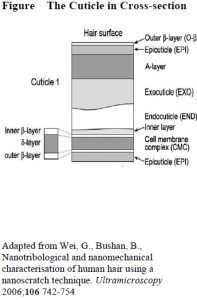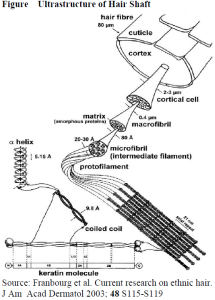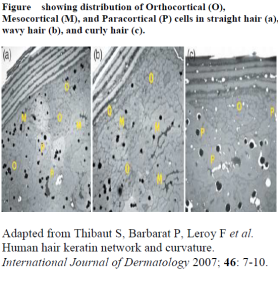The hair shaft is made of a hard protein called keratin. This is the same keratin that comprises skin and nails. The hair shaft has three major components: Cuticle, Cortex and Medulla. It tends to remain uniform in size whilst in its growth phase. The width and shape of the hair shaft is determined by the hair follicle.
The Cuticle
The cuticle is the outermost layer and is composed of several layers of cells, (5-10), arranged in a pattern similar to shingles on a roof. The free edge of the cuticular cells, lie up and outward, with the free edge facing the direction of the tip of the hair shaft. The microstructure of the cuticle is shown below:

The Epicuticle
This is the outermost layer. It is a protein layer with an overlying lipid (fatty acid) layer.
The A Layer
This is proteinaceous layer found at the outer part of each cell. It is compromised of a high percentage of cystine, > 30%. It is rather hardy and is highly resistant to chemical and mechanical attack. Supports the attachment of free fatty acids to the hair’s surface.
The Exocuticle
Closely abuts the A layer, and forms approximately 55% of the cuticle. Also comprised of a high amount of cystine. It is not as rigid as the A layer.
The Endocuticle
Comprised of cellular debris that is pushed to one side during the formation of the A Layer and the Exocuticule. It is softer than the other two layers, and easily swells with water. This therefore affects how the hair shaft responds in water.
The Cellular Membrane Complex
This is composed of lipids, primarily fatty acids: 18 methyl eicosanoic acid (18-MEA), palmitic and oleic acids. This layer determines the combing properties of hair in the wet and dry state. Older and damaged hair have decreased percentage of fatty acids.
The Epicuticle
This is thought to determine the surface properties of the hair.
The Cortex
The cortex forms the bulk of the hair shaft. The cells are long and elongated. They are fused tightly to each other. Each cell contains fine filaments called microfibrils. These microfibrils are made of highly helical proteins giving the unique characteristic of alpha – keratin. The microfibrils are then grouped together in larger bundles called macrofibrils. These bundles are packaged in a certain manner forming the paracortex, orthocortex and mesocortex. The packaging of these fibrils help to determine the hair type.


The Medulla
This structure is not always present. It is usually found in hair fibres of a larger width. The function of the medulla is unknown in humans. It contains a mixture of glycogen, melanosomes and air bubbles. The medulla tends to have a pattern: continuous or discontinuous.